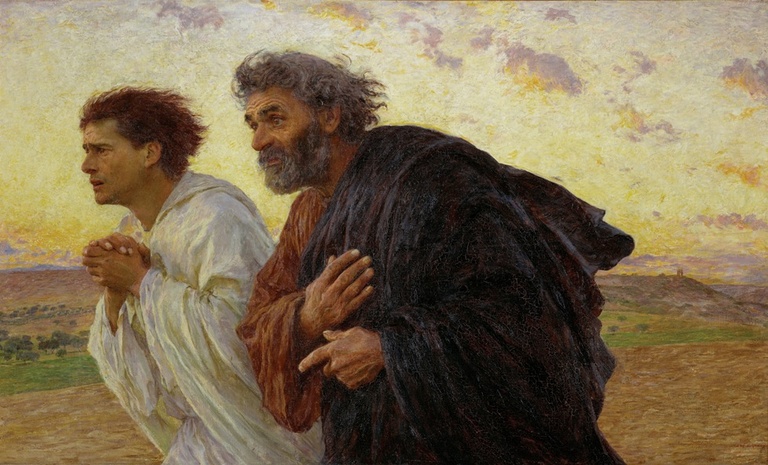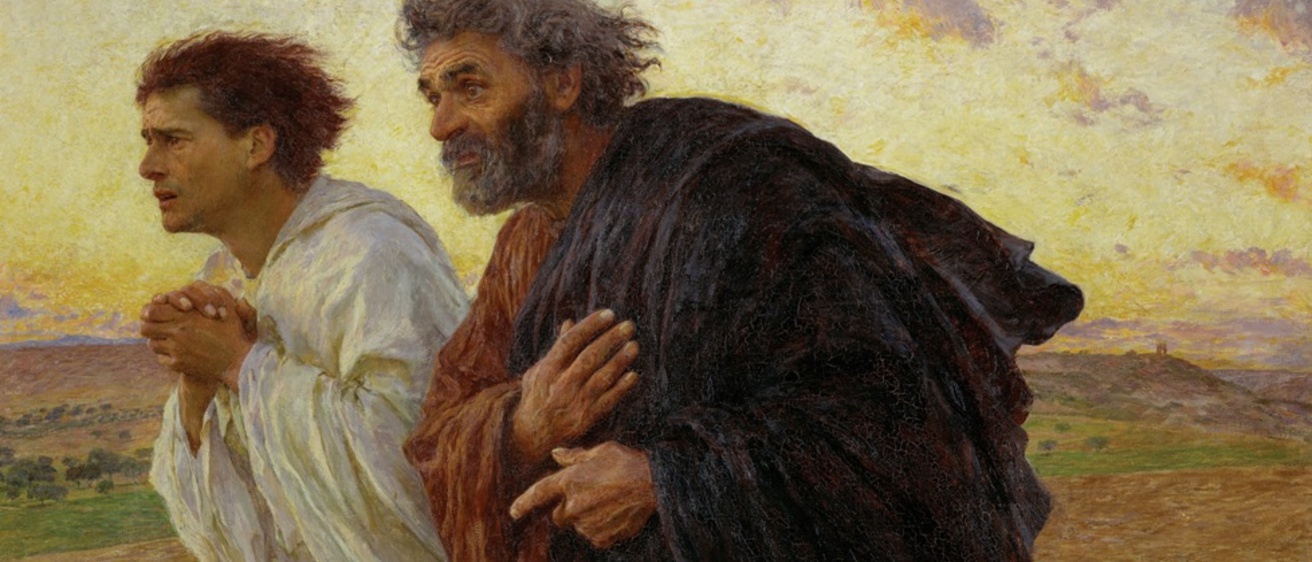The gospels don't reveal many details about the apostles' personal lives. Most are just "followers" that do very little, and the narratives focus more on Jesus's teachings and actions than theirs. Every now and then, however, seemingly random details are included in rather important stories that leave us to wonder if there might be something important behind them.
The resurrection narrative in the Gospel of John provides one such instance that answers a question I frequently get: which apostle was the greatest athlete? The Bible actually provides some evidence regarding one specific athletic event: which apostle was the fastest sprinter?
Upon being told by Mary Magdalene of the empty tomb, Peter and another disciple race to the tomb to confirm the story for themselves. Given Peter's popularity (and his later traditional position as the first Pope), we might expect him to win, but in fact, he loses (John 20:3–10). And, the gospel makes clear that this is not just some random detail given the way it emphasizes this particular point in John 20:4–8:
"These two were running together, but the other disciple outran Peter and reached the tomb first. He bent down to look in … Then Simon Peter came, following him, and went into the tomb … Then the other disciple, who reached the tomb first, also went in."

On three separate occasions, John makes it a point to emphasize that the other disciple reached the tomb first, and outran Peter in order to do so! But who is this other disciple and why does it matter?
There are actually several examples in John's Gospel where Peter is compared to this other disciple, commonly called The Beloved Disciple (more literally, "the disciple that Jesus loved"). For instance, just after Jesus told his disciples that one of them would betray him, John 13:24 oddly notes that, "Peter motioned to (the Beloved Disciple) to ask Jesus of whom he was speaking." Did you see that? Why is Peter subtly asking the Beloved Disciple to ask Jesus a question? It is highly unlikely that they were at a table so large that Jesus couldn't hear Peter. Was it a sign of deference from Peter to the Beloved Disciple? Is Peter going through an established chain of authority? It's an odd little detail, but one that suggests, at least in John's Gospel, that the Beloved Disciple enjoyed a more favored status than Peter.
And then there is the Passion narrative, where Peter denies Jesus three times in John 18:15–27 (perhaps foreshadowing the triple mention of the Beloved Disciple reaching the empty tomb first). And of course, after John depicts Peter denying Jesus, the gospel describes the Beloved Disciple there at the cross, where Jesus names him as an adoptive son to his own mother, Mary, thus welcoming him as an adopted brother (John 19:25–27).
This conflict between disciples is found in many gospels, particularly the later ones. As we see in the Book of Acts, there would arise disputes over authority later within the church, and proximity to Jesus—including receiving instruction and commission directly from him—played a role in establishing an apostle's credentials (cf. Acts 9:26–27; Galatians 1:1, 11–24). So the Beloved Disciple may very well have been the leader of this early community after Jesus's departure and provided their eyewitness (John 19:35), despite the fact that Peter and James get a lot of the credit for being the group's visible and vocal leaders (cf. Galatians 1:18–19; Acts 15).
There have been many theories throughout the years about the identity of the Beloved Disciple. The Gospel of John gets its name from the most popular theory: that the Beloved Disciple is the Apostle John. John is one of the “Holy Trinity” of apostles in most gospels and the later Christian tradition, but interestingly, his name doesn't appear anywhere in the Gospel of John. Hence, the theory goes, the Beloved Disciple must be John, who used this third-person moniker as a literary device in an attempt to thinly veil the fact that he was Jesus's favorite.
The only thing we know for sure, though, is that the Beloved Disciple beat Peter in the ultimate race to win the title of fastest sprinter.
